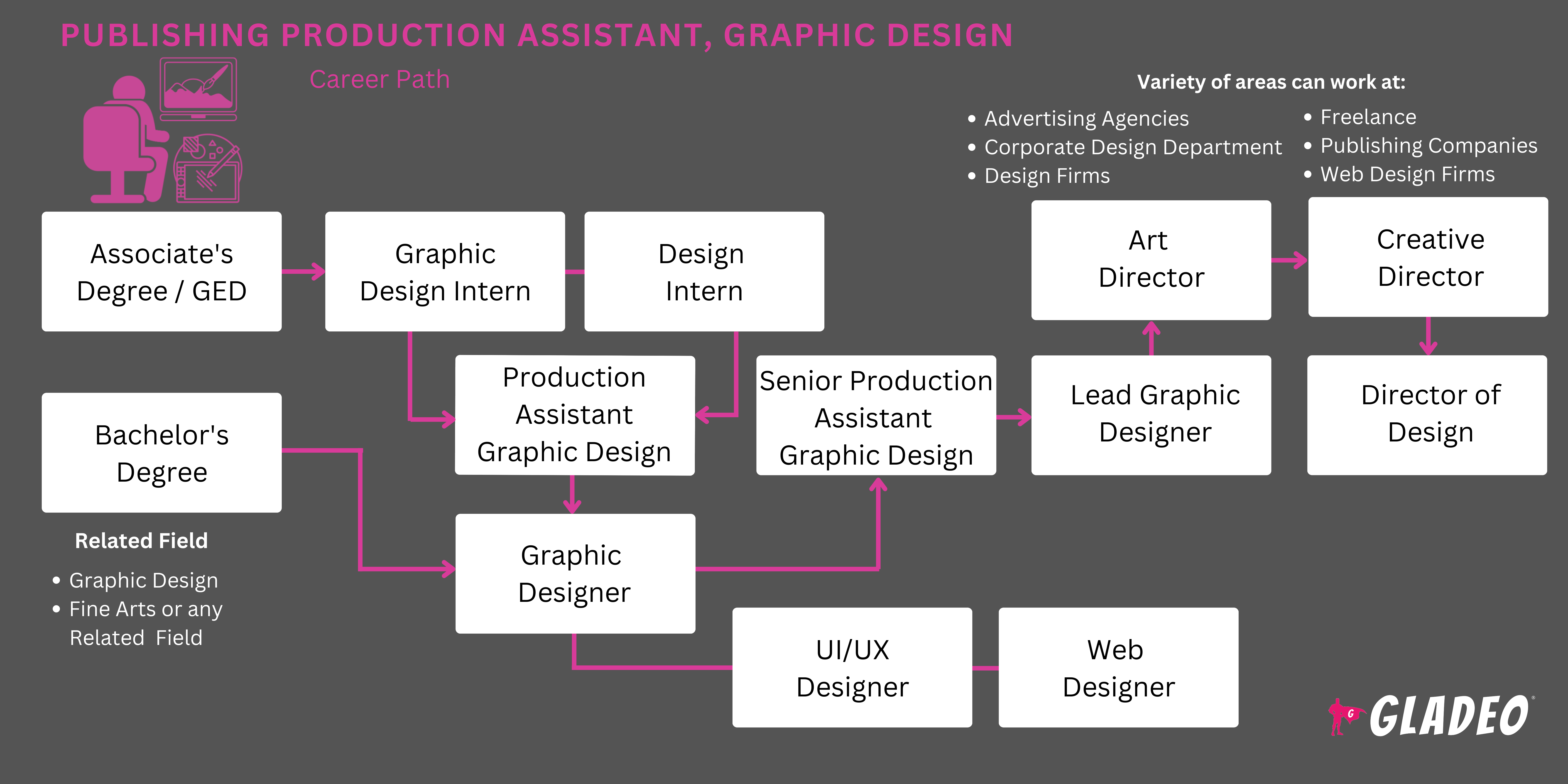Spotlights
Graphic Design Assistant, Production Artist, Design Production Coordinator, Prepress Specialist, Desktop Publishing Specialist, Print Production Assistant, Creative Production Assistant, Design Assistant (Publishing), Layout Artist, Publishing Design Associate
When you’re browsing magazines, books, or comics at a store, how do you decide which one to pick up? Chances are something about the cover grabbed your attention. The same goes for ads and flyers. You might see a million of them, but only take notice of the ones that pop out because of their designs, layout, font, and colors.
Who comes up with all those vibrant covers, ads, and other materials? Graphic Design Publishing Production Assistants! They’re responsible for the production process from start to finish, coordinating with designers, printing press operators, and others to make high-quality publications that get attention.
Publishing Production Assistants need a unique blend of creative and technical skills, including proficiency in graphic design software and an understanding of printing processes. Their role is crucial in ensuring every detail of the final printed product is perfect.
- Contributing to the production of publications and marketing materials
- Opportunities to work with advanced printing technologies
- Collaborating with creative and technical professionals
Working Schedule
Publishing Production Assistants work full-time in publishing houses, design studios, or advertising agencies. Schedules may include nights, weekends, and overtime to meet production deadlines.
Typical Duties
- Provide creative input regarding graphic designs for book covers, magazine covers, comic book covers, catalogs, posters, newspaper ads and flyers, mailers, online advertising campaigns, packaging materials, product labels, etc.
- Review files in Adobe InDesign, PDF, or other prepress formats
- Use digital files and graphic design software to create layouts
featuring designs, fonts, graphics, and other elements - Review and adjust elements before printing or finalizing to ensure color accuracy, appropriate resolution, error-free text, and other quality control
- Coordinate with printing press operators on hardcopy print runs
- Oversee proofing and make last-minute adjustments such as fixing design or artwork issues or typos
- Showing proofs to customers for approval
- Follow production schedules and meet deadlines
- Maintain diligent production records and archives of design elements, images, photos, fronts, etc.
- Manage inventory and order supplies
Additional Responsibilities
- Stay up-to-date on new technologies and graphic design trends
- Help train new workers
Soft Skills
- Analytical
- Attention to detail
- Communication skills
- Creativity
- Good color vision
- Independent
- Observation
- Organization
- Patience
- Planning
- Problem-solving
- Teamwork
- Time management
- Visualization
Technical Skills
- Desktop publishing programs (Adobe Acrobat, Xerox FreeFlow)
- Familiarity with color theory and digital file preparation
- Graphics software (Illustrator, Photoshop, InDesign)
- Inventory management
- Knowledge of different printing presses
- Proficiency in Adobe Creative Suite (Illustrator, Photoshop, InDesign)
- Project management
- Understanding of prepress and post-press processes
- Understanding of printing techniques and materials
- Publishing houses
- Newspapers
- Design studios
- Advertising agencies
- Marketing firms
- Print shops
Businesses in numerous industries rely on the creativity of Publishing Production Assistants who specialize in graphic design. These assistants are integral in producing eye-catching materials that attract consumer attention and lead to better sales.
The role requires up-to-date knowledge of graphic design trends as well as a keen eye for detail. Small overlooked mistakes can lead to major cost overages if an entire print run has to be redone. However, time management is critical, too, due to tight turnaround times. So assistants need to be mindful of schedules but without taking shortcuts that could lead to errors.
As the printing industry continues to evolve to adapt to changing markets, it’s embracing digital printing technologies to lower costs and boost productivity. Many processes are becoming increasingly automated, reducing the need for human labor. Alas, this is ultimately decreasing the need for Publishing Production Assistants and other workers in the publishing field.
Print materials are becoming less popular as consumers increasingly turn to digital resources. As a result, there’s less shelf space in stores for magazines and books to be displayed – and more pressure on publishers to come up with attention-grabbing covers!
Publishing Production Assistants often grew up as avid art fans. They may have enjoyed drawing, painting, or using digital design programs.
- Publishing Production Assistants need at least a high school diploma or GED, plus relevant job experience or academic credentials
- An associate or bachelor’s degree in graphic design, publishing, or a related field is beneficial, but not needed for all jobs
- Workers can learn most of what they need to know for an entry-level job by taking standalone classes at a community college or vocational school. Relevant courses might include:
○ Adobe Creative Suite
○ Color theory
○ Digital media
○ Graphic design
○ Page layout
○ Prepress operations
○ Printing technology
○ Production for design
○ Project management
○Typography
- Some employers provide on-the-job training or apprenticeships
- Popular optional certifications include Adobe Certified Professional in Print & Digital Media Publication Using Adobe InDesign or Visual Design Using Adobe Photoshop
- Publishing Production Assistants don’t need a four-year degree but can benefit from certificate and associate degree courses related to printing technology and graphic design.
- Look for programs with state-of-the-art software and printing equipment where you can get practical hands-on training.
- Ideally, programs should have seasoned faculty members and opportunities for internships or cooperative learning with local employers.
- Consider the cost of tuition, discounts, and local scholarship opportunities (in addition to federal aid).
- Load up on art and design courses. Learn to use graphic design software like Adobe Creative Suite programs (InDesign, Illustrator, Lightroom, Photoshop) and others such as Scrius, Affinity, eMagazines, Foleon, MagLoft, etc.
- Writing, math, and web design are also commonly used skills in this profession
- Gain experience through part-time jobs or internships in design studios or printing press shops
- Take vocational courses in printing technology and prepress operations
- Join design clubs or online communities to network and learn from others
- Build a portfolio of your work to showcase to potential employers
- Study books, online articles, and video tutorials about printing technologies and how to do professional layouts
- Review job postings in advance to see what the average requirements are for entry-level jobs
- Request to do an informational interview with a working
Publishing Production Assistant. Ask if you can shadow them at work for a day - Make a list of your contacts (including email addresses or phone numbers) who might serve as future job references

- Check out job portals such as Indeed, Simply Hired, Glassdoor, and Craigslist
- Look for full or part-time assistant jobs, internships, or apprenticeships to get your foot in the door. If that doesn’t work right away, consider freelancing!
- Talk to working Publishing Production Assistants for advice and job-seeking tips
- Get help from your school’s career center. They may be able to assist with resume writing, interview skills, and connecting with local recruiters
- Check out online Publishing Production Assistant resume templates and review potential job interview questions like “How do you manage tight deadlines and multiple projects
simultaneously when coordinating with designers and printers?” - Include relevant resume keywords such as:
- Adobe Creative Suite
- Color Management
- Digital Media
- File Preparation
- Graphic Design
- Layout Design
- Print Production
- Project Coordination
- Proofing
- Quality Control
- Brush up on terminology and news about the field before heading into interviews. Be ready to discuss your insights about trends and advancements
- Know how to dress for a job interview!
- Be diligent about catching errors and meeting production deadlines
- Ask your supervisor how you can boost your knowledge and skills to serve the company better
- Be the go-to expert on the programs you use. Read software guides and “how-to’s”
- Study supplementary topics such as writing, marketing, and business
- Pay attention to which layouts seem to lead to better sales
- Watch what the competition does and learn from their successes and failures
- Knock out specialized certifications related to new methods and technologies
- Complete your bachelor’s or master’s if it’ll help you move up
- Demonstrate that you can work independently and effectively supervise teams
- Train new workers patiently and thoroughly. Work together effectively as a team!
- Branch out into different types of publishing work to expand your horizons
- Join professional organizations to network and grow your reputation
- Consider relocating if needed to advance your career!
Websites
- American Institute of Graphic Arts
- American Printing History Association
- Association for PRINT Technologies
- Book Industry Study Group
- Color Marketing Group
- Flexographic Technical Association
- Graphic Artists Guild
- Graphic Communications Conference
- International Brotherhood of Teamsters
- International Digital Enterprise Alliance (IDEAlliance)
- Print and Graphic Communications Association
- Printing Industries Association
- PRINTING United Alliance
- Society for News Design (SND)
Books
- Production for Graphic Designers, by Alan Pipes
- The Graphic Designer’s Digital Toolkit, by Allan Wood
Publishing Production Assistants are key players in the media world but the job isn’t for everyone. Some people want to focus more on the technical side of things while others are more interested in the creative aspects of the work. Check out our list of alternative career choices below for other ideas!
- Animator
- Bindery Worker
- Digital Media Specialist
- Digital Press Operator
- Editor
- Graphic Designer
- Marketing Coordinator
- Photographic Process Worker
- Public Relations Specialist
- Prepress Technician
- Print Production Manager
- Production Planner
- Quality Control Inspector
- Writer
Newsfeed

Featured Jobs

Online Courses and Tools

Annual Salary Expectations
New workers start around $35K. Median pay is $41K per year. Highly experienced workers can earn around $49K.






